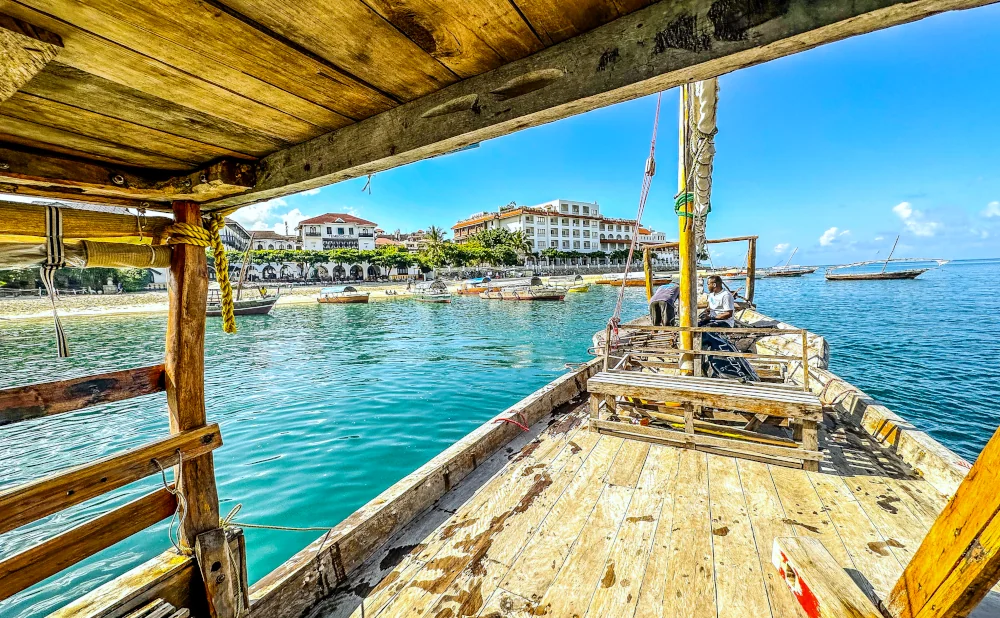Exploring Zanzibar: Culture, History, and Attractions
Zanzibar, an archipelago off the coast of Tanzania, is a destination filled with rich history, vibrant culture, and breathtaking landscapes. Known for its spices, stunning beaches, and historical sites, Zanzibar offers a unique blend of experiences for travelers seeking both relaxation and adventure.
The Allure of Zanzibar's Spices
One of the first things that come to mind when thinking about Zanzibar is its spices. Often referred to as the "Spice Island," Zanzibar has a long history of spice cultivation, which dates back to the time of the Omani sultans. The island's fertile soil and tropical climate make it an ideal location for growing a variety of spices, including cloves, nutmeg, cinnamon, and pepper.
Historical Significance of Spices
Spices have played a crucial role in shaping Zanzibar’s economic and cultural landscapes. Historically, the spice trade attracted traders from across the globe, including Arabs, Indians, and Europeans, who sought the aromatic treasures for their culinary and medicinal uses. This influx of diverse cultures significantly contributed to Zanzibar's rich cultural tapestry. The spice trade also helped establish Zanzibar as a significant port city on the Indian Ocean trade routes.
Spice Tours
Visitors to Zanzibar can embark on spice tours to explore the lush spice plantations and learn about the cultivation and processing of these aromatic treasures. During a spice tour, you will have the opportunity to see, smell, and taste fresh spices while learning about their uses in cooking and medicine. Spice tours not only offer a sensory experience but also provide insight into Zanzibar's agricultural practices and trade history. Moreover, these tours often include a visit to traditional Zanzibari homes, where you can witness local culinary practices and even participate in cooking sessions using freshly harvested spices.
The Role of Spices in Zanzibari Cuisine
The spices grown on the island are integral to Zanzibari cuisine, which is a vibrant fusion of flavors from Africa, Arabia, and India. In local kitchens, spices are used to create aromatic curries, spiced teas, and the famous Zanzibari biryani. Local markets bustle with the scent of cloves and cinnamon, and stalls offer a chance to purchase these spices as well as sample street food that reflects the island’s diverse cultural influences. Understanding the role of spices in Zanzibari cuisine offers a deeper appreciation of the island's culinary heritage.
Zanzibar's Beaches: A Slice of Paradise
Zanzibar is renowned for its pristine beaches, which boast powdery white sands and crystal-clear waters. Whether you're looking for a tranquil spot to unwind or an adventurous location for water sports, Zanzibar's beaches offer something for everyone.
Nungwi and Kendwa
Nungwi and Kendwa, located on the northern tip of the island, are two of Zanzibar's most popular beach destinations. Known for their vibrant nightlife and stunning sunsets, these beaches are perfect for socializing and enjoying the island's lively atmosphere. In addition to relaxation, you can engage in activities such as snorkeling, diving, and dhow sailing. The local beach bars and restaurants offer fresh seafood and tropical cocktails, providing the perfect setting for a sunset meal.
Paje and Jambiani
For those seeking a more laid-back experience, the southeastern beaches of Paje and Jambiani offer a tranquil escape from the crowds. These beaches are ideal for kite surfing, thanks to the steady winds and shallow waters. The small fishing villages nearby offer a glimpse into the local way of life, where you can interact with friendly residents and sample fresh seafood. Evening walks along the beach reveal the bioluminescent plankton that lights up the shoreline, creating a magical experience for night-time beachgoers.
Mnemba Atoll and Coral Reefs
Zanzibar is not only famous for its beaches but also for its rich marine life. The Mnemba Atoll, a small island off the northeastern coast, is surrounded by a coral reef teeming with vibrant fish, making it a premier spot for snorkeling and diving. The atoll offers an underwater adventure, where divers can explore coral gardens, encounter dolphins, and witness the grace of sea turtles. The crystal-clear waters provide excellent visibility, ensuring that every snorkeling or diving trip is a memorable experience.
What is Zanzibar Known For?
Zanzibar's unique identity is shaped by its diverse history, culture, and natural beauty. From its historical Stone Town to its rich Swahili culture, Zanzibar is a destination that captivates the senses and leaves a lasting impression.
Stone Town: A Walk Through History
Stone Town, the historic heart of Zanzibar City, is a UNESCO World Heritage site and a must-visit for history enthusiasts. With its narrow alleys, bustling bazaars, and intricately carved wooden doors, Stone Town is a living museum of Swahili, Arab, Persian, Indian, and European influences. The architecture reflects this blend, with buildings showcasing Omani style alongside British colonial influences. Wandering through the streets, you’ll encounter a myriad of smells from street vendors selling spice-infused snacks.
Historical Sites
As you wander through Stone Town, you'll encounter numerous historical landmarks, such as the House of Wonders, the Old Fort, and the Sultan's Palace. Each site offers a glimpse into Zanzibar's storied past, from its days as a major trading hub to its role in the spice and slave trades. Additionally, the Anglican Cathedral, built on the site of a former slave market, serves as a poignant reminder of the island's complex history. The Slave Chambers offer a sobering look into the past, while the Palace Museum provides insights into the lives of the sultans who once ruled the island.
Swahili Culture and Traditions
Zanzibar is a melting pot of cultures, with a predominantly Swahili population that reflects a blend of African, Arab, and Indian influences. This cultural fusion is evident in the island's language, cuisine, and customs. Festivals such as Eid and the Zanzibar International Film Festival highlight the island’s cultural diversity, drawing visitors who wish to experience Swahili music, dance, and art. Traditional dhow races are held during these festivals, showcasing the nautical skills passed down through generations.
Language
Swahili, the native language of Zanzibar, is widely spoken throughout the island. As a Bantu language with significant Arabic and Persian influences, Swahili reflects the island's multicultural heritage. Visitors are often greeted with "Jambo" (hello) and "Karibu" (welcome), and learning a few basic phrases can enhance your experience and interactions with the local community. Language tours are available, offering travelers a chance to learn Swahili, which can deepen their understanding of the island's cultural nuances.
Cuisine
Zanzibari cuisine is a delightful fusion of flavors, combining African, Arab, and Indian culinary traditions. Seafood is a staple, with dishes like octopus curry and grilled fish served alongside fragrant rice and vegetable stews. The use of spices, such as cloves, cardamom, and turmeric, adds depth and complexity to the island's dishes. For a true taste of Zanzibar, don't miss the opportunity to try "Zanzibar pizza" at one of the island's bustling night markets. These markets are vibrant with activity, offering not just food but also local crafts, music, and a chance to mingle with residents.
Attractions Beyond the Beaches
While Zanzibar's beaches are undoubtedly a major draw, the island offers a wealth of attractions for those seeking to explore beyond the shoreline.
Jozani Forest
Jozani Forest, located in the heart of Zanzibar, is home to the endangered red colobus monkey, a species unique to the island. A guided walk through the forest provides the chance to observe these playful primates in their natural habitat, as well as other wildlife, such as bushbabies and duikers. The forest is also a vital ecosystem for mangroves and serves as an important conservation area. Visitors can learn about the ecological efforts to preserve these habitats and the role of the forest in local folklore.
Prison Island
A short boat ride from Stone Town, Prison Island (also known as Changuu Island) is a popular day-trip destination. Originally used as a quarantine station for slaves, the island is now a sanctuary for giant tortoises, some of which are over 100 years old. Visitors can learn about the island's history, enjoy snorkeling in the surrounding coral reefs, or relax on the sandy beaches. The tortoises are a major attraction, offering an opportunity to learn about conservation efforts and the history of these remarkable creatures.
Cultural Villages and Markets
Exploring the local villages and markets of Zanzibar provides a deeper insight into the island's vibrant culture. Markets like Darajani in Stone Town offer a sensory overload of sights, sounds, and smells, with stalls brimming with fresh produce, spices, and handmade crafts. Village tours often include visits to local schools and homes, where travelers can engage with residents and learn about traditional crafts such as weaving and pottery. These experiences offer a personal connection to the island's cultural heritage and daily life.
Zanzibar is a destination that offers a rich tapestry of experiences, from its aromatic spice plantations and pristine beaches to its historical sites and vibrant culture. Whether you're exploring the narrow streets of Stone Town, lounging on a sun-drenched beach, or savoring the island's diverse cuisine, Zanzibar promises an unforgettable journey that will leave you longing to return. As you plan your visit, remember to immerse yourself in the island's unique blend of history, culture, and natural beauty, and discover what makes Zanzibar truly special. Each visit to this enchanting island offers new discoveries, ensuring that Zanzibar remains a cherished destination for travelers worldwide.











